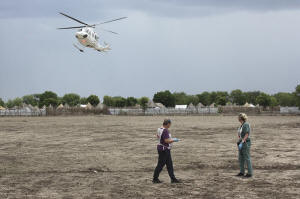Civilian casualties mount in South Sudan amid fighting between army and
local militias
[June 03, 2025]
By JOSEPH FALZETTA
AKOBO, South Sudan (AP) — Wiyuach Makuach sat on her bed in a dimly lit
ward of a hospital near South Sudan ’s border with Ethiopia and rested
her remaining arm in her lap as she recalled the airstrike that took her
other arm and nearly killed her.
“Everything was on fire,” she said in an interview at the hospital in
the border town of Akobo where she was being treated for her injuries.
The bombing happened on May 3 at another hospital in the northern
community of Fangak where she had traveled to be with her 25-year-old
son while he sought treatment for tuberculosis. A series of strikes
there, including several at the Doctors Without Borders facility, killed
seven people.
“I ran outside and started rubbing mud on myself to stop the burning,”
Makuach said.
Makuach, 60, is just one of the dozens of civilians who aid groups say
have been killed or badly injured by airstrikes in recent weeks as South
Sudan’s army clashes with militia groups across the country. The army
says it targets only combatants, and has not commented on civilian
casualties.
“The army displaced us and our families into the bush and that’s when we
decided we would fight back,” said Gatkuoth Wie, 24, who was wounded
while fighting in northern Jonglei State.
The fighting has led to U.N. warnings that South Sudan is again on the
brink of civil war. Meanwhile, U.S. President Donald Trump's
administration is seeking to send to South Sudan a group of eight
deportees from Cuba, Vietnam and elsewhere who have been convicted in
the U.S. of serious crimes, sparking a legal fight that has reached the
Supreme Court.

Many of those wounded in the South Sudan clashes have been transported
to Akobo, where the International Committee for the Red Cross has set up
a temporary surgical response. Others have been stranded for days by the
fighting.
Doctor Bjarte Andersen, a surgeon working with the ICRC, says that the
fighting has made it difficult to transport patients that have been
critically wounded. “We know of one person who has died waiting for
transportation, but there are probably more,” he said.
“The most critical cases cannot even be moved, they are not likely to
survive the journey,” said Christina Bartulec, who oversees the
organization’s medical operation in Akobo.
The ICRC does not track which patients are combatants and which are
civilians. Most of the people brought to their facility are young men,
several of whom told The Associated Press that they were engaged in
fighting.
In the past month, however, an increasing number of the victims have
been women and a few children, according to hospital staff.

[to top of second column]
|

Medical staff with the International Committee of the Red Cross (ICRC),
wait for weapon-wounded patients in Akobo, South Sudan, Saturday,
May 24, 2025. (AP Photo/Joseph Falzetta)

One is Kuaynin Bol, 15, who was gravely injured by a blast as he lay
asleep in his home. Surgeons have removed bone fragments from his
brain and performed four operations on his leg, which was badly
broken.
Simmering tensions between the government and opposition groups
erupted in March when a local militia called the White Army overran
a military barracks in Nasir, a town in the country’s northeast.
The government pinned responsibility for the attack on First Vice
President Riek Machar, placing him under house arrest and detaining
other members of his SPLM-IO party. It also brought in Ugandan
forces to support a sweeping military offensive against opposition
troops and community militias across the country.
That offensive centered on Upper Nile State and allegedly involved
use of improvised incendiary weapons that Human Rights Watch has
said killed at least 58 people, including children.
In May, the fighting spread to northern Jonglei State where Fangak
is located, a region previously unaffected by the violence, after
the government alleged several barges were hijacked by opposition
forces there.
Isaac Pariel, a member of Machar's opposition party who is the local
chairman in Fangak of the government's Relief and Rehabilitation
Commission, said that at least 25 civilians have been killed this
month. But the true toll is likely higher, as much of the fighting
has taken place in remote areas that are inaccessible to medical
workers.
One bombardment in the village of Wichmon on May 15 killed 12 people
including 8 children, according to local authorities and one
eyewitness. The Associated Press was unable to independently verify
those figures.
The government has not officially claimed responsibility for the
strikes.
Army spokesman General Lul Ruai Koang told The Associated Press he
was not authorized to comment on “ongoing military operations across
the country.”

The violence has been devastating for civilians already reeling from
successive humanitarian crises.
Much of the fighting has taken place in South Sudan’s Greater Upper
Nile region, a vast floodplain that in recent years has been ravaged
by extreme weather, disease, and severe food insecurity.
“The people here are moving all the time, just during the night,”
said William Nyuon, a Fangak resident. “They fear the plane will
come and bomb them again.”
All contents © copyright 2025 Associated Press. All rights reserved |